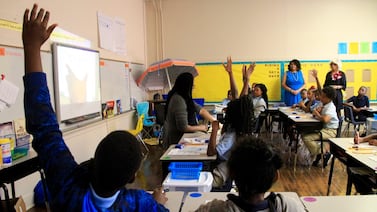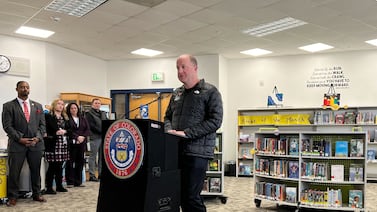The Chicago school board unanimously approved a new system for evaluating campuses that district leaders vowed will make the city a national leader in rethinking how to size up school quality.
The new policy, named “Continuous Improvement and Data Transparency,” formally replaces the district’s controversial school ratings system, which had long come under fire for overemphasizing standardized test scores and unfairly labeling high-poverty campuses.
The new approach does away with rating schools on a five-point scale from 1+ to 3. A separate policy the board approved will adopt three new labels that largely correspond to the state’s designations for schools, as required under the law.
Under the new accountability policy, the district will compile a wide array of metrics and present them to parents and the public — rather than using a complex calculation to produce a ranking as the old system did. A new dashboard with that data will go live sometime during the 2024-25 school year, based on data from this coming school year.
And while the policy aims to hold the district accountable for providing the money, guidance, and other resources schools need to improve, it does not spell out any consequences for campuses that are not making headway.
At the Wednesday board meeting where the policy was approved, district CEO Pedro Martinez said the new system reflects Chicago’s commitment to equity and marks a break with a punitive approach to evaluating schools. He said national leaders, including U.S. Secretary of Education Miguel Cardona, are watching Chicago’s overhaul closely, though Martinez called it “a work in progress.”
The district will flesh out how to capture some metrics and create the public dashboard over the next two years, officials said.
John Easton, an expert at the University of Chicago’s Consortium on School Research who was part of an advisory group that crafted the new policy, called the approach “soft accountability”: “We are using a flashlight and not a hammer.”
He applauded the inclusion of more metrics that will attempt to capture how schools are supporting students’ social-emotional well-being and sense of belonging on campus.
Stakeholders overhaul school ratings system amid pandemic pause
The new policy was developed by an group made up of educators, administrators, parents, students, and experts. The Chicago Teachers Union and the Chicago Principals and Administrators Association, which were also involved, have said there is much to like about it, such as more metrics that aim to capture school climate and culture.
But these two organizations urged the board not to approve the policy until it clarifies better what it aims to measure and how.
At Wednesday’s board meeting, teachers union president Stacy Davis Gates said she appreciates that the policy focuses on “inputs” — the dollars, staff, and other support the district gives campuses — as well as student outcomes. She said the policy is “beginning to look like something that makes sense, finally.”
The district’s old school accountability system, known as School Quality Ratings Policy, or SQRP, has been on hold since 2020, when COVID scuttled in-person district and state testing.
The new policy will continue to highlight proficiency and growth on state tests, attendance, high school graduation, and college enrollment. It will also share information about nonprofit and other community partnerships, quality curriculums, and a slew of metrics aiming to capture the student and educator experience on campus.
The three new labels — In Good Standing, Remediation, and Probation — will largely track with the state’s own designations for schools, which are based on test scores, attendance, and other data.
Lisa Jean Walker, a researcher at the University of Illinois in Chicago who addressed the board as a community member, said the district should actively challenge state and federal laws that require these designations rather than merely complying with them.
She said under the now-defunct SQRP, the majority of schools with the lowest ratings served Black students, and all had student bodies with high needs, including large populations of homeless students. Labels such as “probation” stigmatized schools, she said, and have not led to improvement on those campuses.
“Ratings are going away, but the categories remain,” said Walker, an expert on school improvement. “Where is the relief for the Black community?”
Policy moves from punitive to supportive
But school board members and those involved in creating the policy touted the process of crafting it and the final result.
Natalie Neris, the chief accountability officer at the nonprofit Kids First Chicago, which handled outreach on the policy, said it represents a groundbreaking departure from a usually top-down approach to policy-making, in which “experts meet in an ivory tower, make decisions, and then those decisions are imposed on communities.”
Alfonso Carmona, the district’s chief portfolio officer, said a key goal was moving away from punishing struggling schools, including by saddling them with ratings that can lead families to balk at enrolling there. Instead, the focus is on giving them added help to improve.
“We still have to pay attention to student outcomes,” he said. “But the schools should not be penalized as they try to get to where they need to be.”
Carmona said the district made significant changes based on public comment on the policy it has been collecting since March. It split what was initially a single policy into two, with a separate document on the school labels in a bid to comply with state law. The policy now also includes more specific on how the district will hold itself accountable in supporting its schools.
District officials said the district will next work on getting a better handle on exactly how to measure some factors included in the new policy and building the dashboard to feature the data. Some metrics will go live next year, and some in 2025.
“If we want to be a leader in the nation,” school board president Miguel del Valle said, “then we have to get this right.”
Mila Koumpilova is Chalkbeat Chicago’s senior reporter covering Chicago Public Schools. Contact Mila at mkoumpilova@chalkbeat.org.






